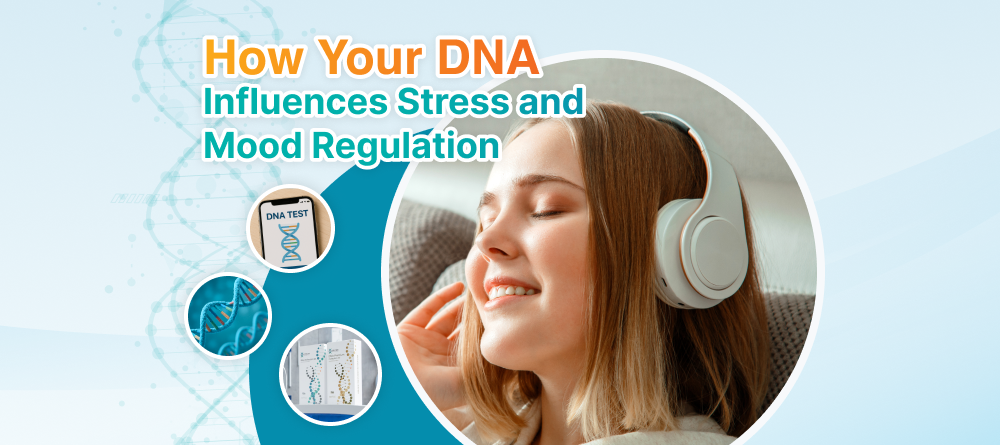Feeling anxious, drained, or overly reactive? Your genes may be the reason. Discover how DNA affects your stress and mood—and how personalized nutrition and lifestyle changes can help you stay calm, focused, and resilient.
Introduction
Ever wonder why some people remain calm under pressure while others feel overwhelmed by minor setbacks? While environment and life experiences play a major role in emotional resilience, your genetic blueprint also significantly influences how you handle stress, regulate mood, and recover from adversity.
Specific genes affect the production and breakdown of neurotransmitters like serotonin, dopamine, and norepinephrine—chemicals that govern your mental health, focus, and emotional stability. By decoding your DNA, you can better understand your stress responses and implement personalized strategies for emotional balance.
The Genetics of Mood and Stress
Several genes influence how efficiently your brain produces and processes neurotransmitters. These include:
1. COMT (Catechol-O-methyltransferase)
- Regulates breakdown of dopamine, epinephrine, and norepinephrine.
- Fast COMT: Clears dopamine quickly, leading to calm under stress but possible low motivation.
- Slow COMT: Retains more dopamine, which can fuel drive—but may also increase anxiety.
2. MAO-A (Monoamine Oxidase A)
- Breaks down serotonin and dopamine.
- Variants impact susceptibility to mood swings, irritability, and aggression under stress.
3. SLC6A4 (Serotonin Transporter Gene)
- Influences serotonin reuptake in the brain.
- Short allele (S): Associated with higher stress reactivity and increased risk of depression.
- Long allele (L): Offers greater emotional resilience.
4. BDNF (Brain-Derived Neurotrophic Factor)
- Supports neuroplasticity—your brain's ability to adapt and recover.
- Certain variants are linked to reduced resilience and increased risk of mood disorders.
5. MTHFR
- Impacts folate metabolism and methylation, crucial for neurotransmitter synthesis.
- Mutations can contribute to serotonin and dopamine imbalances, brain fog, and irritability.
Signs Your Genes May Be Affecting Your Mood
You might have genetically influenced emotional patterns if you experience:
- High stress sensitivity or “emotional flooding”
- Low motivation or difficulty concentrating
- Anxiety or depression without clear external causes
- Poor sleep quality
- Fatigue that worsens with emotional effort
The Role of Methylation in Mood Regulation
Methylation is essential for producing neurotransmitters. Impaired methylation can lead to:
- Decreased dopamine and serotonin synthesis
- Inadequate stress hormone clearance
- Heightened anxiety or depressive symptoms
Supporting your methylation pathways through nutrition and lifestyle can significantly improve emotional health.
Natural Ways to Support Mood and Stress Based on Your Genetics
1. Use Methylated B Vitamins
- Especially B9 (methylfolate), B12 (methylcobalamin), and B6 (P-5-P)
- These nutrients support neurotransmitter production and methylation balance
2. Eat a Brain-Friendly Diet
- Include omega-3 fatty acids, leafy greens, fermented foods, and berries
- Avoid processed sugar, alcohol, and synthetic folic acid
3. Practice Adaptive Stress Management
- Meditation and breathwork can buffer the effects of genes like SLC6A4
- Cold exposure, journaling, and nature walks enhance BDNF and dopamine response
4. Exercise with Intention
- Moderate aerobic activity boosts serotonin and BDNF
- Resistance training enhances dopamine sensitivity
5. Sleep Consistently
- Genes related to mood regulation are highly sensitive to circadian rhythm disruption
Why Standard Approaches Often Fail
Conventional mental health treatments often overlook the root causes of emotional imbalance—especially genetic ones. What works for one person might not work for another due to:
- Poor response to generic B vitamins
- Underlying methylation issues
- Misalignment with natural neurotransmitter cycles
GeneusDNA: Personalized Insights for Emotional Resilience
GeneusDNA empowers you to take control of your mental well-being by revealing how your genes influence stress, emotion, and neurochemical balance. With their personalized reports, you’ll discover:
- Your neurotransmitter profile and mood-regulating gene variants
- Your methylation efficiency and how it relates to mental clarity
- Actionable strategies for supplements, nutrition, and lifestyle tailored to your DNA
With GeneusDNA, emotional wellness becomes a science—not a guessing game.
Written by: Dr. Arnond Kitnitchee


